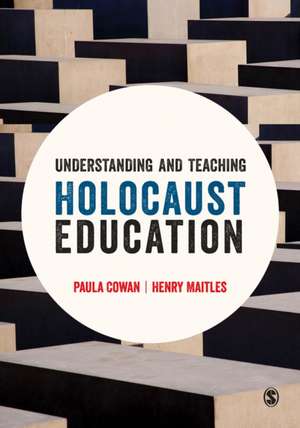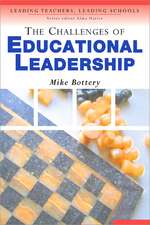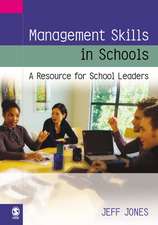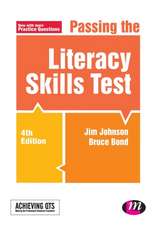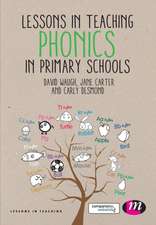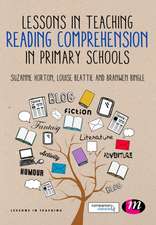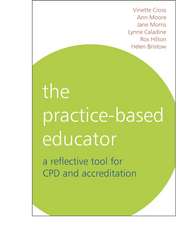Understanding and Teaching Holocaust Education
Autor Paula Cowan, Henry Maitlesen Limba Engleză Paperback – 18 dec 2016
The Holocaust is a controversial and difficult teaching topic that needs to be approached sensitively and with an awareness of the complex and emotive issues involved. This book offers pragmatic pedagogical and classroom-based guidance for teachers and trainee teachers on how to intelligently teach holocaust education in a meaningful and age-appropriate way.
Key coverage includes:
- Practical approaches and useful resources for teaching in schools
- Holocaust education and citizenship
- Holocaust remembrance as an educational opportunity
- How to explore the topic of anti-semitism in the classroom
- Exploring international perspectives on holocaust education
| Toate formatele și edițiile | Preț | Express |
|---|---|---|
| Paperback (1) | 358.35 lei 6-8 săpt. | |
| SAGE Publications – 18 dec 2016 | 358.35 lei 6-8 săpt. | |
| Hardback (1) | 826.81 lei 6-8 săpt. | |
| SAGE Publications – 18 dec 2016 | 826.81 lei 6-8 săpt. |
Preț: 358.35 lei
Nou
Puncte Express: 538
Preț estimativ în valută:
68.57€ • 72.11$ • 56.66£
68.57€ • 72.11$ • 56.66£
Carte tipărită la comandă
Livrare economică 17 aprilie-01 mai
Preluare comenzi: 021 569.72.76
Specificații
ISBN-13: 9781473919341
ISBN-10: 1473919347
Pagini: 192
Dimensiuni: 170 x 242 x 13 mm
Greutate: 0.34 kg
Ediția:First Edition
Editura: SAGE Publications
Colecția Sage Publications Ltd
Locul publicării:London, United Kingdom
ISBN-10: 1473919347
Pagini: 192
Dimensiuni: 170 x 242 x 13 mm
Greutate: 0.34 kg
Ediția:First Edition
Editura: SAGE Publications
Colecția Sage Publications Ltd
Locul publicării:London, United Kingdom
Recenzii
Paula Cowan and Henry Maitles have written an excellent book. The authors declare that "the central aim of this book, as its title suggests is to support teachers and educators in their teaching of the Holocaust in schools". They have more than succeeded. There is a good discussion of centrally important issues about how the Holocaust is characterised and valuable elaborations of how it may be included in the work of schools and in other contexts. The issues are extremely sensitive and there will be continuing controversies. This book makes a signifcant contribution to the development of education for a better world.
This is an important and useful book. It introduces the sometimes difficult issue of how to introduce the significance of the Holocaust and of antisemitism to children and young people. The authors are experts in the field, and write from a background of teaching in schools and to student teachers, with authority and clarity.
It is first and foremost a practical book, full of advice, suggestions, provocations and a wealth of background information, and pointers to further study and reading. But it also gives a closely argued analysis of the nature of the Holocaust, and why it is so important that young people continue to study it, react to it, learn from it – it is a work of theory that critically informs our ideas of the purposes of education
Cowan and Maitles have successfully shed light on a number of important topics, including controversial issues, in Holocaust education today.
"I was intrigued to see how something as seismic and complex as the Holocaust can be structured into a topic for school children. The book begins by justifying schoolbased Holocaust Education, and then looks at what young people can learn about and from the Holocaust to increase their understanding of contemporary citizenship....One chapter I found particularly fascinating was ‘Pedagogy’ which looks at how to deal with the many controversial issues surrounding the Holocaust....All in all a fascinating read."- Jo Briggs
This book is a must have for all educators in the teaching area of Social Sciences, in particular History and Religious and Moral Education. It is a well written book that is organised in a straight forward way, useful for the teacher to pick up and refer to easily.
This book should be read by anyone involved or interested in Holocaust education. The two authors have researched into and written about Holocaust education for over two decades. They are explicit that this is not “a practical guide” (142), mercifully refraining from easy quick answers based on “this worked for me” arguments; instead they set out “to broaden and develop teachers’ and educators’ understanding of the key issues in Holocaust Education” (192). The book is a professional dialogue: you are forced to reflect on your own ideas and assumptions, whilst, at times, you will also find yourself arguing with the authors. What more can you ask of a book on education?
This is an important and useful book. It introduces the sometimes difficult issue of how to introduce the significance of the Holocaust and of antisemitism to children and young people. The authors are experts in the field, and write from a background of teaching in schools and to student teachers, with authority and clarity.
It is first and foremost a practical book, full of advice, suggestions, provocations and a wealth of background information, and pointers to further study and reading. But it also gives a closely argued analysis of the nature of the Holocaust, and why it is so important that young people continue to study it, react to it, learn from it – it is a work of theory that critically informs our ideas of the purposes of education
Cowan and Maitles have successfully shed light on a number of important topics, including controversial issues, in Holocaust education today.
"I was intrigued to see how something as seismic and complex as the Holocaust can be structured into a topic for school children. The book begins by justifying schoolbased Holocaust Education, and then looks at what young people can learn about and from the Holocaust to increase their understanding of contemporary citizenship....One chapter I found particularly fascinating was ‘Pedagogy’ which looks at how to deal with the many controversial issues surrounding the Holocaust....All in all a fascinating read."- Jo Briggs
This book is a must have for all educators in the teaching area of Social Sciences, in particular History and Religious and Moral Education. It is a well written book that is organised in a straight forward way, useful for the teacher to pick up and refer to easily.
This book should be read by anyone involved or interested in Holocaust education. The two authors have researched into and written about Holocaust education for over two decades. They are explicit that this is not “a practical guide” (142), mercifully refraining from easy quick answers based on “this worked for me” arguments; instead they set out “to broaden and develop teachers’ and educators’ understanding of the key issues in Holocaust Education” (192). The book is a professional dialogue: you are forced to reflect on your own ideas and assumptions, whilst, at times, you will also find yourself arguing with the authors. What more can you ask of a book on education?
Cuprins
Chapter 1: Introduction
Chapter 2: The Nature of Holocaust Education
Chapter 3: Citizenship and Holocaust Education
Chapter 4: Antisemitism
Chapter 5: The Complexities of Holocaust Remembrance
Chapter 6: The Importance of Language
Chapter 7: Pedagogy
Chapter 8: Teaching the Holocaust in Primary Schools
Chapter 9: Classroom Teaching Approaches
Chapter 10: Learning from Auschwitz
Chapter 11: Epilogue
Chapter 2: The Nature of Holocaust Education
Chapter 3: Citizenship and Holocaust Education
Chapter 4: Antisemitism
Chapter 5: The Complexities of Holocaust Remembrance
Chapter 6: The Importance of Language
Chapter 7: Pedagogy
Chapter 8: Teaching the Holocaust in Primary Schools
Chapter 9: Classroom Teaching Approaches
Chapter 10: Learning from Auschwitz
Chapter 11: Epilogue
Descriere
Pragmatic and teacher-focused book on how to approach the controversial and difficult teaching topic of the Holocaust.
